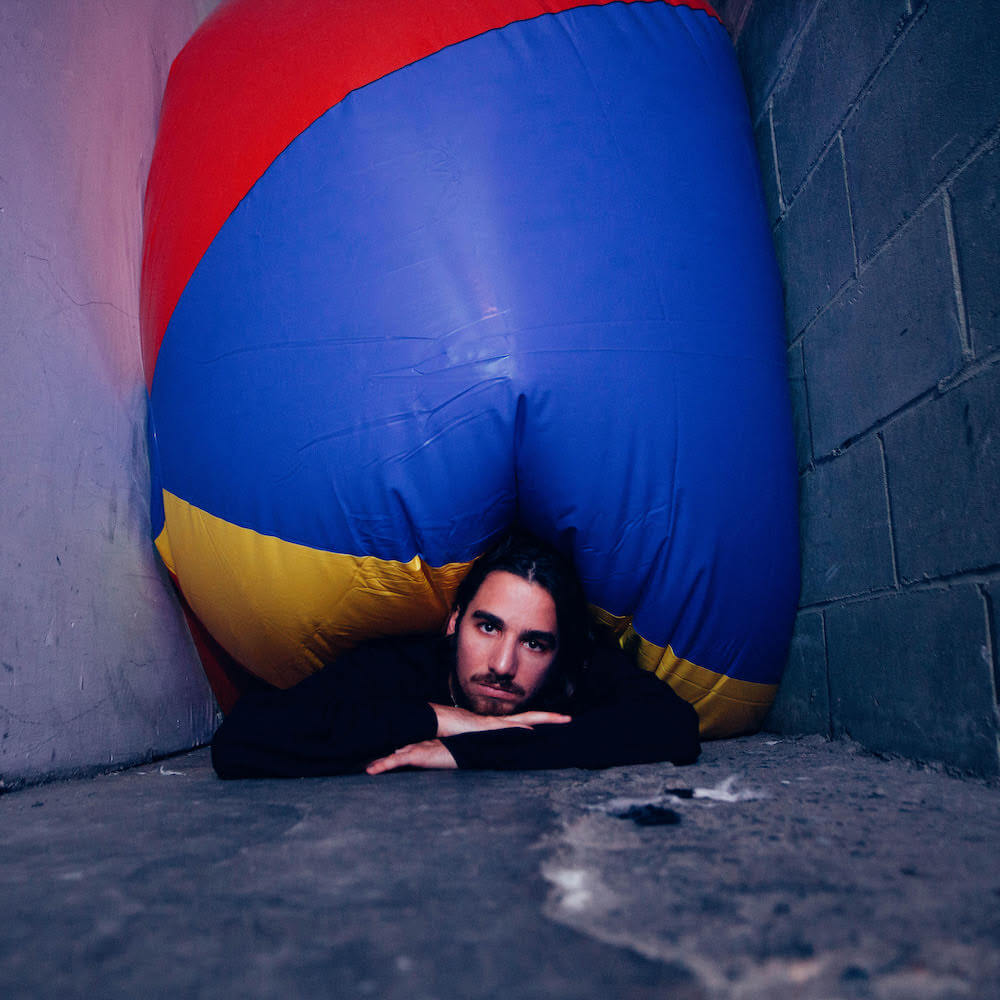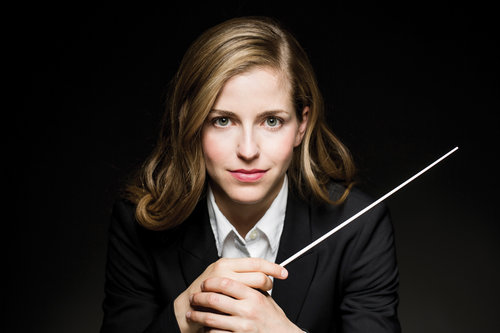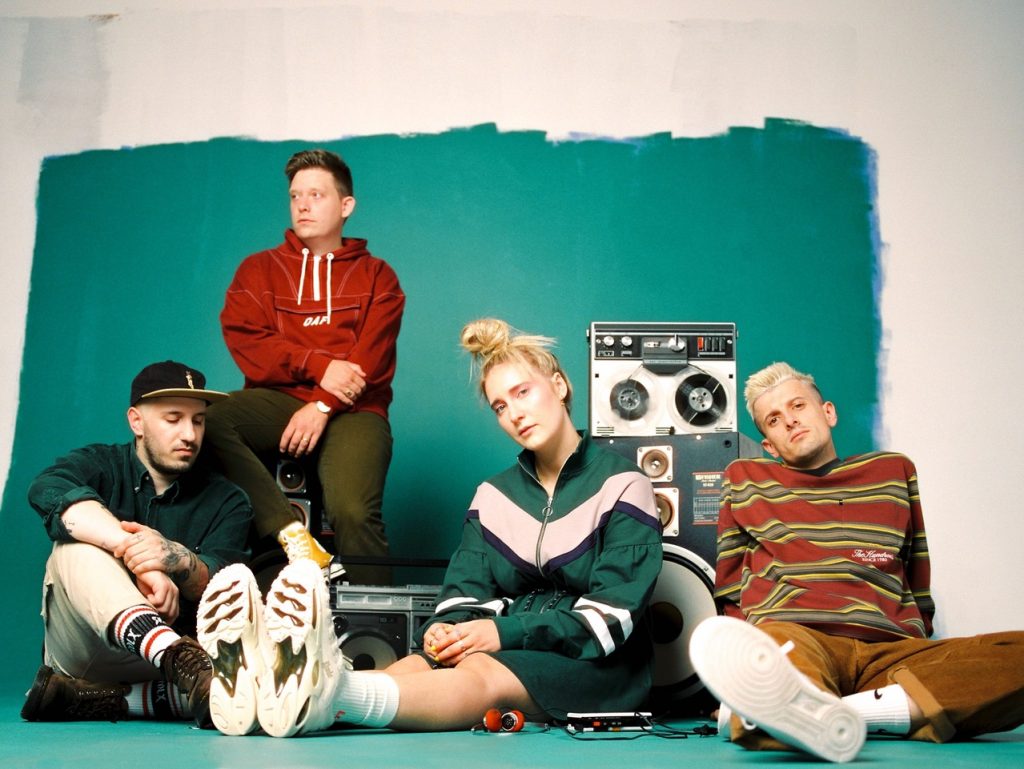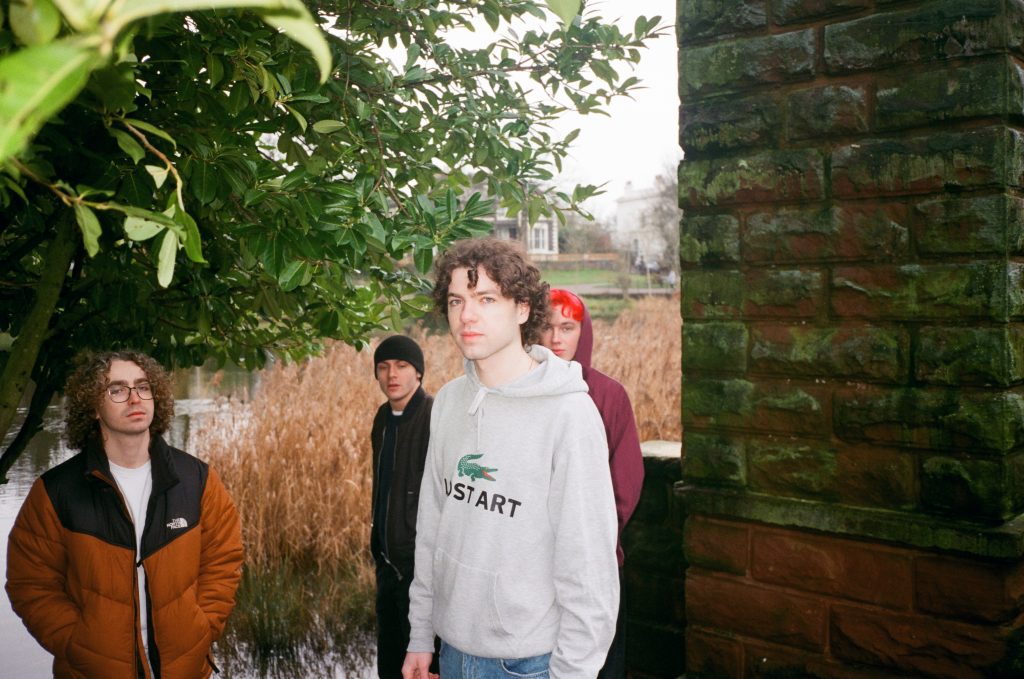Two New Solo Tracks From Antibalas Drummer Miles Francis

When New York-based Miles Francis released his first solo EP, Swimmers, in February of this year, he had already played the drums in several noteworthy ensembles. In addition to being a former member of Afrobeat group Antibalas, he has also toured with Arcade Fire’s Will Butler and performed on stage with Angelique Kidjo, Amber Mark, Sharon Jones, and more.

In October, Miles released the surreal and comedic music video for “Sophomore Slump,” which features him popping balloons like it’s an ennui-inducing 9-to-5 office job and being crushed by a giant beach ball as he glumly outlines the new dance sensation in which you “tense up your body” and “freeze up your mind.” Last week he released another great new track, called “Adult Life,” and recorded a live session with Paste Magazine.
Recently, Miles was kind enough to delve into the stories behind the newly released tracks, and we also got to learn more about his aversion to looping, how touring with Will Butler inspired his first solo EP, and who he considers his two “pillars” of drumming.
Tell me about your new songs, “Adult Life” and “Sophomore Slump.” How did they come about? What was going on in your life when you were writing and recording them?
Releasing music as a solo artist had been a dream of mine for a long time, and it took me years to make Swimmers because I wanted it to feel absolutely complete. It was a big milestone for me to finally release it. After it was released, though, I was on the other side of that milestone – and that mental and emotional place presented new fertile ground to draw from. I went from dreaming up this vision, spending years searching for it, and then I got there – and now what? I had successfully embarked on my solo career and was deeply happy I had done so – but when I returned to the studio to continuing writing, I had sort of a slow epiphany. I realized that every time I go to make another song, I have to put myself back in the frame of mind of chasing that initial vision. Otherwise, I’ll be in my head, a few steps removed from my most free expression, and the result won’t be as authentic. That’s where “Sophomore Slump” stemmed from – I wanted to capture that feeling and laugh at it a little bit.
From there, I found myself thinking about childhood and adulthood, and how we grow up dreaming of adulthood only to get there and yearn for childhood. Our society likes to pair adulthood with maturity, knowledge and wisdom, but to me that’s upside down. One of my favorite concepts is the “beginner’s mind,” a Zen Buddhist idea that Shunryu Suzuki talks about in his book Zen Mind, Beginner’s Mind – the idea that we should always maintain the openness and lack of ego of a beginner, no matter how advanced we are. Who are the ultimate “beginners”? Children. Kids have a wisdom that adults don’t, because they embrace ignorance in a beautiful way – they are completely open to learning and exploring. As young people get older, they become obsessed with maturity and establishing themselves in the world. That’s the perspective from which I wrote “Adult Life” – the compulsion to be an adult and leave childish things behind, even though what you’re leaving behind is an inner freedom that is very hard to get back. The reality is that adults are having a tough time getting through, and we should look to the children for lessons in wisdom.
All your songs have such multi-faceted rhythms, and I was surprised to learn you don’t use looping in any of them. Why not?
I play all of the instruments on my songs by multi-tracking over myself, so it would be easy to make it super airtight and overly ‘perfect’. The thing I love most about true bands, like Devo or Talking Heads, is how they breathe together – the tempos fluctuate, the dynamics move up and down, and the spotlight gets passed around the band. That is possible for solo artists, too. Artists like Stevie Wonder, Prince, and Brian Wilson understood how to breathe as a band when recording solo, and that is my goal. For me, the key is performing each element live throughout the song, because it gives the song an overall arc. It usually feels good to accelerate a little bit leading into the chorus, for example, which is something bands inherently understand – and when you loop everything, it’s harder to capture that sort of energy. I use an old version of Pro Tools with fairly limited capability, and no plug-ins outside of the basics. This ends up fostering a similar approach to recording to tape, because I’m focusing on recording the performances live instead of relying on quantizing. This leaves room for mistakes, some of which add to the music in interesting ways, and overall it gives the music more of a “band in the room” feeling.
What instruments or other gadgets do you use most often when creating your music? Do you have a favorite one (or a favorite effect) right now?
In How Music Works, David Byrne talks about how a musical performance is influenced by the room it takes place in, and I think the same way about the recording process. So to me, the instruments you have around you in your studio – turned on and ready to go – are just as much a part of the songwriting process as recording the lead vocal. The instruments I keep around me are extensions of me, my limitations and my skills. For example, I frequently use monophonic synthesizers like Korg MS-20 and the Yamaha CS-01 because they allow me to build up chords note by note instead of figuring out two-hand chord voicings (which I’m not quick at). I’m a drummer first, so I keep all of my drum machines together, turned on and ready to go, and combine them to make my beats – along with my live drums and shelves of percussion instruments. My go-to drum machines are the DSI Tempest, Linn Drum, Yamaha DD5, and the Korg Monotribe, and I usually record to a drum machine beat instead of a click track because it inspires more energy off the bat.
Every song I make, I try to let the character of the song lead me to the sounds. On “Sophomore Slump,” there’s sort of a cartoon quality to the whole thing. That lead me to tracking the DrumFire DF-500 – a weird drum trigger machine from the early 80s – to create those kooky electro tom fills throughout the song. As I would perform the fill with my right hand, I’d manipulate the pitch with my left hand, which became a fun game. I also played a Trumpet Kazoo throughout the song, doubling the bass line and playing a solo towards the end. On “Adult Life,” there are a lot of mouth sounds accenting the beat, which reminded me of childhood, when beatboxing was all the rage. These aren’t conscious decisions – I try not to think too much when I’m recording. I like to spend a night throwing ideas and sounds at the wall, and deciding later what works and what needs tweaking.
For the “Sophomore Slump” and “Adult Life” music videos and the Swimmers mini-film you collaborated with filmmaker Charles Billot. How did you two meet? What have you enjoyed about working together?
Since I make all of the music on my own, it’s a very personal process. Once I finished recording Swimmers, Charles happened to reach out after we hadn’t spoken for a while – the year prior I was introduced to his work from a friend. I had spent many nights looking at all these mini film experiments he had on his website – they were abstract yet relatable, mesmerizing yet discomforting. I immediately knew I wanted to work with him. We spent many months meeting to plan Swimmers, and then a year creating it. I found in Charles a true “in-the-trenches” collaborator, and creating films became a part of the Miles Francis project. Whenever we work together it feels like we are in a band together, which is nice to feel as a solo artist. Charles is brilliant at capturing the feelings behind the music and translating them to visualizations – a simple concept, but extremely hard to do in a subtle way. In making Swimmers, I even discovered what my feelings were behind the music through the process of working with Charles on the visuals. He plans out videos meticulously, but every shoot involves improvisation and being open to happy accidents. This mirrors my recording and writing process and creative philosophy in general. So, as you can tell, Charles and I operate on the same level and I consider myself very lucky to have found him – this is just the beginning of our work together!

You’ve collaborated and performed with so many well-known artists during the last decade, from The Roots to Sharon Jones to Will Butler. Which collaborations have you learned the most from and why?
I first saw Will Butler play with Arcade Fire in 2014, and I immediately noticed him out of the many people onstage. He has a incredibly special energy onstage and I was inspired from afar. He was playing just one part of a huge ensemble, adding to the menagerie of sounds going on; yet he was commanding his role in such a powerful way, without getting in the way of the greater Arcade Fire show. This reminded me of seeing Antibalas for the first time, when I was in high school – there were 13 musicians onstage, all making sounds, but Victor Axelrod was coolly sitting at the organ doing his part in the most understated and tasteful way. They were all doing that – playing their own part within the greater ensemble, to create a big living and breathing force. I eventually joined Antibalas and learned that the band was made up of individual visionary artists in their own right, each with their own fantastic solo projects – but when they all came to play with Antibalas, they set aside their egos and play their role within the greater ensemble.
When I got to play in Will Butler’s band throughout 2015-2016, I watched him perform up close and saw how gifted a performer he is in his own right. This was subconscious back then, but in retrospect I now know that every time I watched him it filled me up with more and more fire to explore my own voice, my own passion as an artist. I felt a kinship with his performing style, like we were cut from a similar cloth, and it empowered me. Up until then, I had hidden behind the drums a little bit, as they were my first instrument and my first language. After working with Will, I began embracing other sides of myself that I had explored privately my whole life – writing and recording my own music solo. From that point forward, I began writing and working on Swimmers.
Who is your pick for the greatest drummer of all time, and why? You can choose 2 or 3 if you have to.
I’ve been making “favorite drummers” lists since I was 6 years old, so that’s a deep question for me – but I’ve definitively decided that my two pillars are Ringo and Tony Allen. They are the pillars for me. Tony was Fela Kuti’s drummer in the 70’s and 80’s and helped invent the afrobeat sound. Tony’s legacy is his magical ability to hold down a beat while improvising on top of it like a dancer, simultaneously propelling the song forward and directing the dynamics up and down. (Fela’s “Upside Down” is a glowing example!) Ringo is the master of ego-less drumming – always playing what the song needs, nothing more nothing less, with a rhythmic pocket that gave Beatles songs a subtle funk underneath the lyrics and melody. (“Hello Goodbye” and “Sgt. Pepper’s Lonely Hearts Club Band (Reprise)” are two of my favorite examples.)
These two are the masters of playing in service of the song, from two very different angles. The lessons I’ve learned from them as a drummer influence me as a songwriter and musician in general. Their restraint and lack of ego stay in my subconscious no matter what instrument I am tracking or what musical situation I am in.

What are your favorite NYC venues, and why?
I grew up in NYC with a jazz musician father, so a lot of my nights have been spent in various types of music venues since I was a child. A lot of beautiful venues have come and gone – Southpaw in Park Slope comes to mind – however, my favorite small venue for the last few years has been C’mon Everybody in Bed-Stuy. It’s a great sounding room, first of all – but furthermore, Eric Sosa (the owner) understands how important it is for a space to have good energy. Whether you’re playing a show or there to see one, you feel warm and welcome. That welcome is extended to all areas – the process of booking a show there is always efficient and drama-free, the people who work there are kind, and there is encouragement in the air to be yourself.
I played once at Carnegie Hall in 2014 – that place is nice too.
What else are you working towards right now?
I am working towards EP2 in early 2019. I’ve been thinking a lot this year about what it means to be a man – specifically the concept of being a “good man”. Men are experiencing a necessary and overdue reckoning, forced to finally confront their problematic behavior that they’ve spent lifetimes taking as the norm. Men are reacting in many varied and surprising ways to that confrontation, and that’s what I am fascinated in. That’s all I’ll say for now!
Follow Miles Francis on Instagram and other social media at @instamiles. You can also catch his upcoming show at Philadelphia’s Free Candy on December 14.





